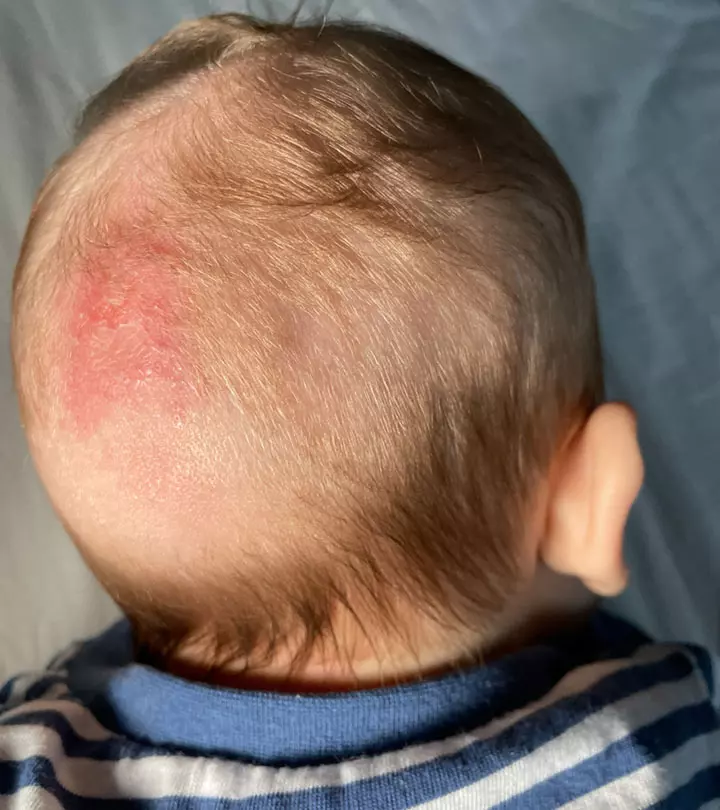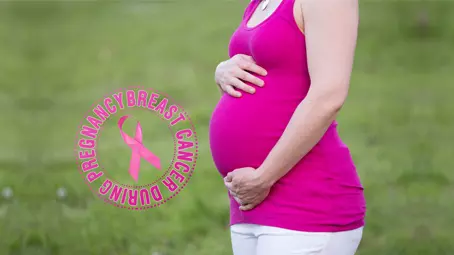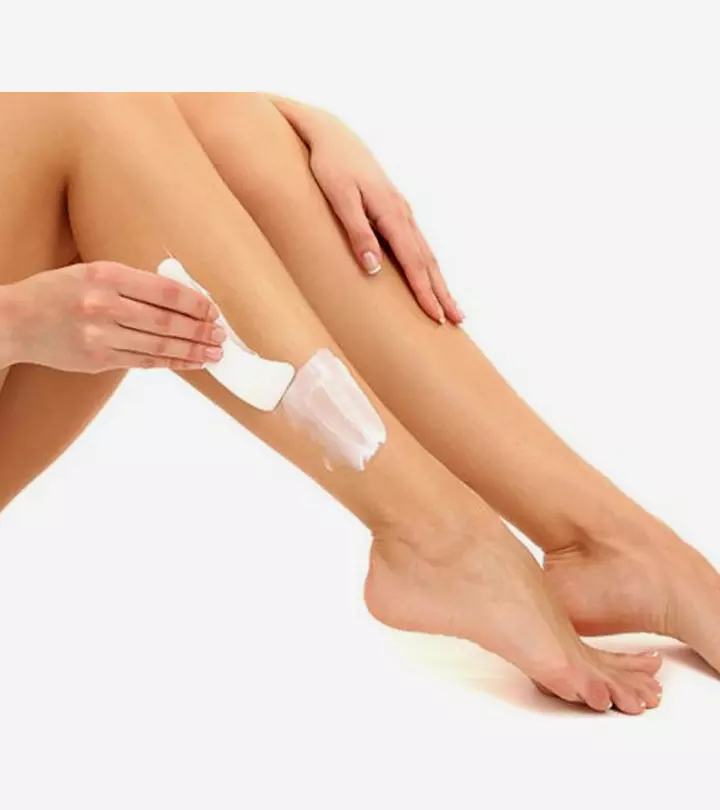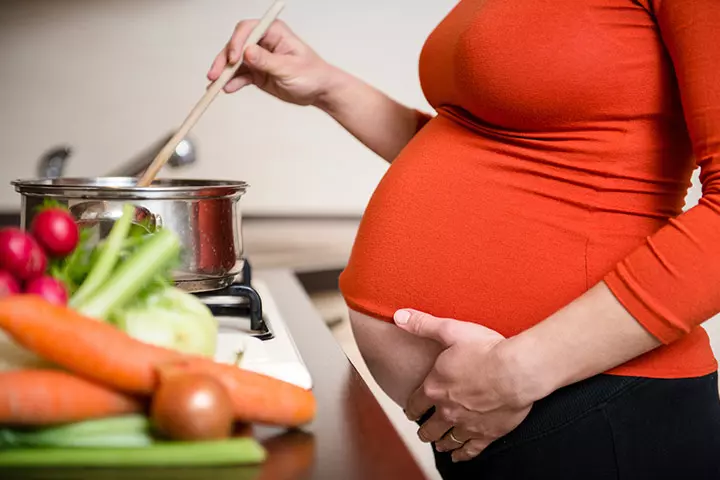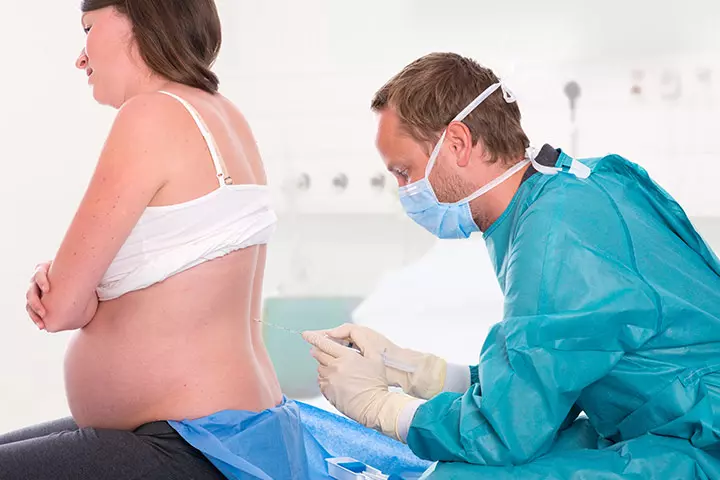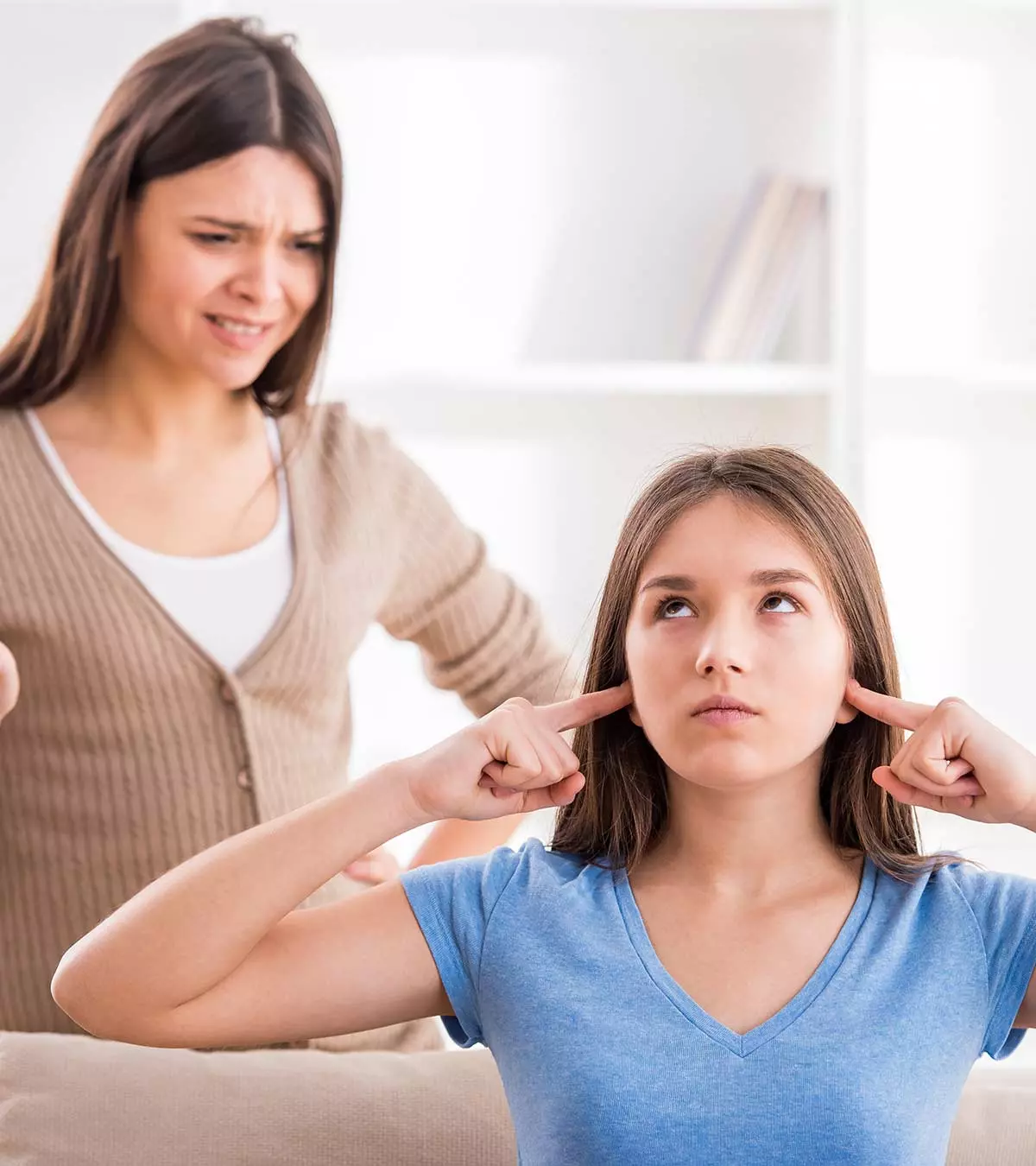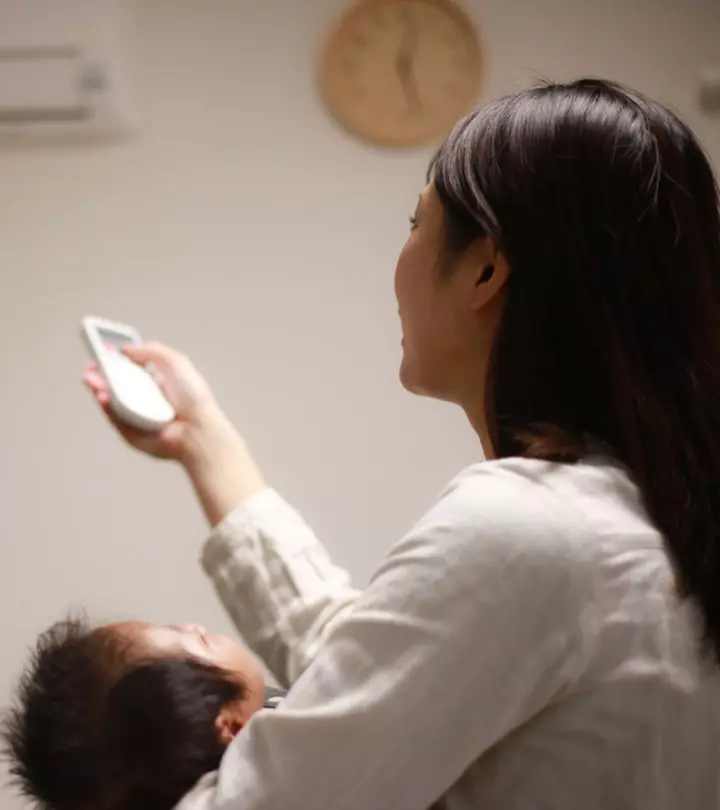
Image: iStock
An air conditioner for babies can protect them from the scorching heat of summer by providing some relief. A cool environment is conducive for babies to get an undisturbed and sound sleep. However, before setting up an air conditioner in your baby’s room, you need to be aware of some important things. Knowing the proper usage and precautions can help create a comfortable and safe sleeping environment for your little one. If you’re wondering about the safety of air conditioners for your baby’s room, read through for the answer and learn a few tips on how to keep your baby safe.
Key Pointers
- Air conditioners are safe for babies when an optimum temperature of 65℉- 72℉ (18-21C) is maintained.
- Some benefits of using an air conditioner are that it keeps the room comfortable and prevents dehydration in babies.
- If not used cautiously, air conditioners may deplete moisture from the baby’s skin or lead to hypothermia.
Is Air Conditioning Safe For Babies?
When used in moderation, an air conditioner can help reduce the risk of dehydration and sudden infant death syndromeiThe unexpected death of a child below one year for which the reason was unknown. (SIDS) caused due to high indoor room temperature (1). However, you need to take certain precautions to maintain an optimal temperature that is not too cold, as babies’ bodies are not fully developed to regulate their body temperature (2).
Maintaining a comfortable living space during the hot summer months requires proper temperature control. When used cautiously, an air conditioner has some benefits to offer.
- It can help keep the room at the optimal temperature in summer. The recommended room temperature for babies is 65℉- 72℉ (18-21C), irrespective of the season (3).
- It helps keep the room comfortable and cozy for your little one to sleep like a log.
- It can prevent dehydration in babies.
An AC may prove counterproductive if you do not take necessary precautions.
- If the optimal room temperature is not maintained, it might lead to hypothermia in babies.
 Be watchful
Be watchful- Germs and allergens can get logged in the air filters and ductworksiThe system of ducts used to transport air from air conditioning equipment. of the AC, which can cause respiratory issues in babies (5).
- AC can also deplete moisture from your baby’s skin and make their skin rough and dry (6).
However, by taking care of these aspects, you can provide your baby a safe and cool environment.
Tips To Ensure Your Baby’s Safety While Using An Air Conditioner

Here are some tips to help ensure your baby’s health and well-being and prevent any potential issues caused by air conditioning (7).
1. Maintain the optimal temperature
Try to maintain the optimal room temperature, and do not make the room too cold as it might lead to hypothermia in babies. Make it a habit to regularly check the temperature settings of the AC and readjust it to remain within the recommended range.
2. Position air vents away from the crib
Make sure you place the baby’s crib away from the air vents of the air conditioner.
The direct cold air can make your baby feel chilly. While designing your baby’s nursery, position the crib away from the air conditioning vents.
3. Dress the baby appropriately
Knowing how to dress babies for sleep is important to ensure their comfort and safety, especially in varying room temperatures. Dress your baby in light layers that cover their arms and legs. You may also use a soft cap to protect the head. This would prevent the baby’s body from getting cold. Although the room temperature may be optimal, you need to cover your baby with one extra layer while making them sleep in an air-conditioned room. Avoid using a blanket to cover your baby (below six months) as it may increase the risk of suffocation (8).
 Quick tip
Quick tip4. Control the air-conditioned time
It is important to keep the air conditioner on for a limited period to prevent the room from getting too cold. If your AC has a built-in alarm clock, set it to the duration needed to cool the room down. If the AC does not have a built-in alarm clock, set the alarm on your smartphone. Check the temperature of the room from time to time to ensure your baby is comfortable.
5. Conduct regular maintenance
ACs attract dust and germs, which get deposited in the filters and ductwork. Using AC units that are dirty can circulate germs and allergens into the air, posing a threat to your baby. Follow a strict schedule and get your AC unit cleaned. Also, ensure you take out the air filters and wash them regularly, especially if your child has a medical history of asthma, frequent sneezing, itchy skin, and recurrent conjunctivitisiInfection or inflammation of the membrane that surrounds the eyelids and eyeballs. .
6. Clean the room occasionally
Shut all the doors and windows while using an AC unit in your child’s nursery. When the AC is not in use, open the doors and windows and clean the room. Also, ensure you let the sun and external air enter your baby’s room.
7. Monitor humidity levels
Ensure the air in your baby’s room does not become too dry, as it can lead to discomfort for your baby. Consider using a humidifier to maintain an optimal humidity level. The American Academy of Pediatrics (AAP) recommends using a cool mist humidifier to help maintain healthy air moisture levels (9).
Alternative Methods To Cool Your Baby’s Room

You could also implement some alternative methods to keep your baby’s room cool if you are not comfortable using an AC.
- Use a ceiling fan alongside the AC to improve air circulation. This can help distribute cool air more evenly throughout the room while reducing the reliance on the AC. A study explored the connection between room ventilation during sleep and the risk of sudden infant death syndrome (SIDS). It states, “Fan use may be an effective intervention for further decreasing SIDS risk in infants in adverse sleep environments (10).”
- You may use an air cooler. Although it may not cool the room as efficiently as an AC, it is cheaper and may not consume much power.
- You may use a dehumidifieriA device that removes moisture from the air. and a ceiling fan to keep the humidity at bay and keep the room cool.
- You may consider using curtains to block the heat and keep the room cool.
In addition to these methods, ensure maximum comfort by dressing your baby in light, breathable clothing during summer and giving them a bath before bedtime to help them stay cool.
 Quick tip
Quick tipAC Vs. Air Cooler

AC is a better choice than air coolers for cooling down the room efficiently. If you live in an extremely hot place, you may choose an AC.
Air coolers are low maintenance and cheaper than AC. AC consumes more power, and you may need a technician to get them serviced from time to time. In the case of air coolers, you can clean them yourself.
Air coolers are not suitable for humid places, as too much moisture in the air can reduce the cooling effect. Keep the door open to let the moisture escape the baby’s room.
ACs are relatively safe for babies when used cautiously. Getting your baby’s room air-conditioned is a personal choice, but if you plan to do so, it is important to keep in mind the safety aspects and strictly follow them. Also, do not overuse an AC as your baby might get used to it and may not sleep without it. So, consider switching on the AC only when the weather is too hot.
Frequently Asked Questions
1. Is a fan or an AC better for babies?
To ensure your baby stays comfortable in hot weather, you may use a fan or an AC to keep your baby’s room to maintain a cool or comfortable room temperature for babies. However, do not have a fan or AC directly onto your baby’s head or face. Instead, place your baby’s cot in an area of the room with uniform air circulation (11).
2. Does AC cause cough in babies?
A well-maintained air conditioner does not cause any respiratory illnesses. But, if your air conditioning unit is not clean, it may cause coughing due to dirt-lodged filters and impure air (12).
3. How do I know if the baby is cold at night with AC?
You may check if your baby’s extremities and skin on their tummy or back are cold during the night. If they do, it is important to wrap them in comfortable clothing or adjust the room’s temperature to aid your baby’s sleep without any disturbance (4).
4. Can a child with a fever sleep in AC?
Dr. Leah Alexander, a pediatrician from Fairview, New Jersey, explains, “The coolness of an AC will not cause an infant to become ill or develop a fever. Air conditioners can help keep the baby’s room at a safe temperature in warm weather conditions. The recommended room temperature to prevent sudden infant death syndrome (SIDS) is between 68 and 72 degrees Fahrenheit. Even if the baby has a fever, it is ok to use an air conditioner to keep the room within this temperature range.”
Using an air conditioner for babies is safe, provided you strictly follow the recommended safety precautions. When used cautiously, the AC can keep the baby’s room at optimal temperature during summers and prevent dehydration and SIDS caused by high indoor temperatures. However, avoid its overuse since the baby may get used to staying in air-conditioned rooms and may not be comfortable without an AC, even in normal weather conditions. So, use an AC only when the weather is too hot for comfort.
Infographic: Is It Good To Use An Air Conditioner In Your Baby’s Room?
Air conditioners may make your baby’s room comfortable during hot and humid weather conditions. However, certain precautions are necessary to ensure that the baby’s safety is not compromised. The infographic below discusses ways to use an air conditioner to provide optimum comfort to your baby.

Illustration: Momjunction Design Team
Illustration: Is It Safe To Have An Air Conditioner For Babies Room?
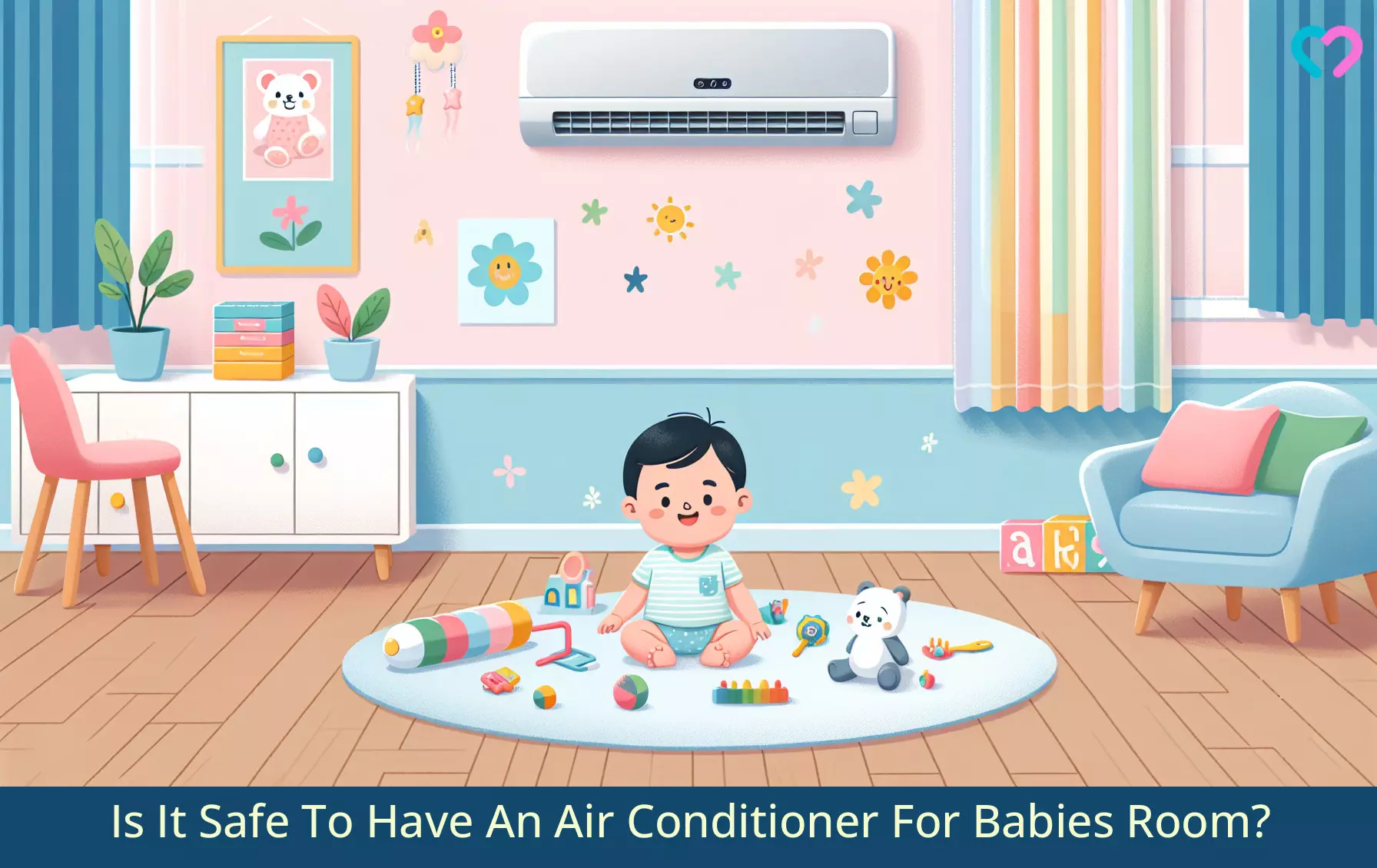
Image: Dalle E/MomJunction Design Team
References
- Iny Jhun et al; (2018); Ambient Temperature and Sudden Infant Death Syndrome in the United States.
https://pmc.ncbi.nlm.nih.gov/articles/PMC5552234/ - Desaline Joseph et al; (2014); Getting rhythm: how do babies do it?
https://pubmed.ncbi.nlm.nih.gov/25245173/ - Ideal Room Temperature for Babies.
https://www.sleepadvisor.org/room-temp-for-baby/ - Babies in cold weather.
https://www.pregnancybirthbaby.org.au/babies-in-cold-weather - Amira Hassan Al-abdalall; (2019); Impact of Air-Conditioning Filters on Microbial Growth and Indoor Air Pollution.
https://www.intechopen.com/chapters/68598 - Air Conditioning Effects on Health.
https://gethealthsummit.org/air-conditioning-effects-on-health/ - Air Quality And Temperature.
http://www.bethelccs.org/content/air-quality-and-temperture - How to Dress a Baby for Sleep.
https://www.sleepfoundation.org/baby-sleep/how-to-dress-baby-for-sleep - Vaporizer or Humidifier: Which Is Best?
https://www.chop.edu/news/health-tip/vaporizer-or-humidifier-which-best - Kimberly Coleman-Phox et al; (2008); Use of a fan during sleep and the risk of sudden infant death syndrome.
https://pubmed.ncbi.nlm.nih.gov/18838649/ - Babies in hot weather.
https://www.pregnancybirthbaby.org.au/babies-hot-in-weather - Why Does Air Conditioning Make Me Cough?
https://breathebetterair.org/all-post/air-conditioning-cough/
Community Experiences
Join the conversation and become a part of our nurturing community! Share your stories, experiences, and insights to connect with fellow parents.
Read full bio of Dr. Aarti R. Motiani
- Dr. Mubina Agboatwalla is the head of the department of pediatrics at Karachi Liaquat Hospital, Pakistan. She has over 20 years of experience in the field of pediatrics and 50 research papers published in international journals including Lancet and JAMA. Dr. Agboatwalla is also a public health specialist specializing in preventive health including nutrition, breastfeeding and infectious diseases, especially diarrhea, polio, and tuberculosis. She has affiliations with the Center of Disease Control Atlanta (CDC), UNICEF, and WHO.
 Dr. Mubina Agboatwalla is the head of the department of pediatrics at Karachi Liaquat Hospital, Pakistan. She has over 20 years of experience in the field of pediatrics and 50 research papers published in international journals including Lancet and JAMA. Dr. Agboatwalla is also a public health specialist specializing in preventive health including nutrition, breastfeeding and infectious diseases, especially diarrhea, polio, and tuberculosis. She has affiliations with the Center of Disease Control Atlanta (CDC), UNICEF, and WHO.
Dr. Mubina Agboatwalla is the head of the department of pediatrics at Karachi Liaquat Hospital, Pakistan. She has over 20 years of experience in the field of pediatrics and 50 research papers published in international journals including Lancet and JAMA. Dr. Agboatwalla is also a public health specialist specializing in preventive health including nutrition, breastfeeding and infectious diseases, especially diarrhea, polio, and tuberculosis. She has affiliations with the Center of Disease Control Atlanta (CDC), UNICEF, and WHO.
Read full bio of Swati Patwal
Read full bio of Rohit Garoo
Read full bio of Ghazia Shah






